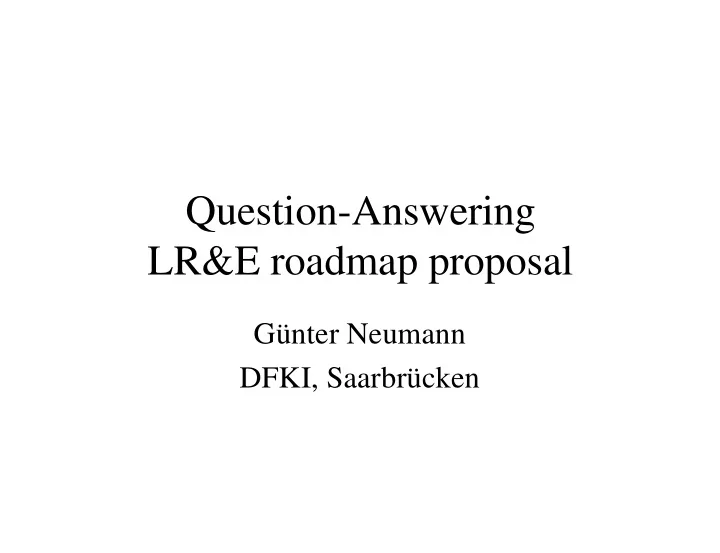

Question-Answering LR&E roadmap proposal Günter Neumann DFKI, Saarbrücken
QA: general aspects • QA is AI-complete – Proper decomposition of the whole QA problem is necessary • QA seen as embedded basic functionality – Important to identify the core QA functionality, which is stable and independent from specific QA application scenarios – Proper identify relationship to other research areas, e.g., IE, IR, KRR, SW, MT, ... • Bottom-up system development („divide-and-interact“) – Data-oriented user, domain, task adaptive systems – Machine Learning & Explanation component – Cooperating specialised QA-components/agents
QA research subtasks 1. cross-lingual, open-domain QA, 2006 2. large-scale domain-specific QA, 2008 3. adaptive QA, 2010
Cross-lingual, open-domain QA • Already in progress: e.g., CLEF • Additonal needs, e.g., – Real cross-language answer sources (not just English) – NL-generation of answers into query language – Evaluation standards for complex queries (e.g., definition, template questions)
Large-scale domain-specific QA • Answers queries about a certain domain – fine-grained domain ontology – specialized lexica and sub-grammars • Parts of the domain-related knowledge are automatically acquired by the QA-system • The system has restricted capabilities of interaction – request relevant information for controlling its internal decision process • In dependence of the type of question and the answer sources (raw text, marked-up web pages, numeric data) – the system recognizes and plans appropriate answer selection strategies – as well as the answer generation mode: depending on current QA-context, e.g., short answer string, (multi-media) summary, pointers into ontology, etc.)
Adaptive QA • QA system is able to adapt towards user, domain, data sources. • The QA-system has restricted dialog capabilities. • It builds up and treats a structured episodic memory, which it uses as source for self-evaluation, machine learning of novel QA-strategies, and setting up context awareness. • QA system (in interaction with a domain expert) is used for building up domain knowledge. • In order to improve/adapt its performance, system is able to create its own questions in order to perform self-initiate QA-cycles. • QA-system can communicate with other self-adaptive QA-systems in order to built up a society of specialized QA-agents.
Recommend
More recommend